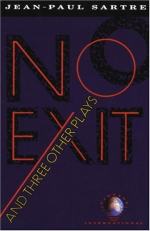|
This section contains 665 words (approx. 3 pages at 300 words per page) |

|
"Le Mauvaise Foi" in Sartre's Huis Clos
Summary: Huis Clos, written by Jean Paul Sartre, touches on many themes of Existentialism. The main one, perhaps, could be said to be the concept of bad faith. This short essay discusses the use of bad faith throughout the book, and how it effects each character.
Jean Paul Sartre wrote Huis Clos with the intent to create a world and develop characters that models his Existentialist beliefs. One of the main underlying themes of the play was the concept of "mauvaise foi (bad faith)," or the theory that with absolute freedom comes the responsibility one must have to oneself. If one abuses his freedom (of choice) and is not faithful to his heart and the knowledge that all his actions have consequences, Sartre states that he has bad faith. Furthermore, a person who allows others to influence their decisions so that they are no longer true to their own ideals qualifies as bad faith. Using all three characters as examples, Sartre portrays bad faith on three different levels - and allows their flaws to distinguish the conceptual variations of "le mauvaise foi."
Estelle could perhaps be seen as Sartre's main example of bad faith...
|
This section contains 665 words (approx. 3 pages at 300 words per page) |

|


